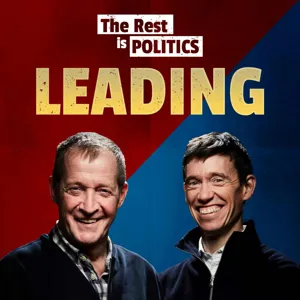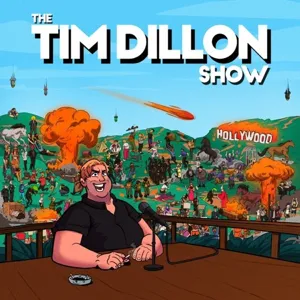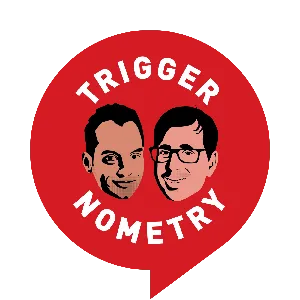Podcast Summary
The Israeli-Palestinian conflict's impact on interfaith relations: The Israeli-Palestinian conflict's international complexity is fueling domestic tensions, straining community relations, and leading to calls for accountability.
The relationship between international and domestic politics, specifically the Israeli-Palestinian conflict, has never been more complex or contentious. The interview with Ed Kessler, recorded in March 2023, highlights the increasing tensions within societies regarding this issue. The controversy surrounding the death of aid workers in Gaza and the fallout from it is just one example of the rising tension between communities. Hamas' attack on October 7, 2022, which sparked the ongoing conflict, was likely not intended to worsen interfaith relations, but it has had that effect. The international issue of Israel-Palestine is becoming increasingly domestic, leading to calls for accountability and strained community relations. Ed Kessler, a scholar and expert on interfaith relations, has spent 30 years working on these issues and emphasizes the current challenges.
Personal stories and leadership in resolving conflicts: Understanding different perspectives and personal stories can lead to courageous leadership and resolution in conflicts, such as the ongoing one in the Middle East. Rita, a refugee from Vienna during the Nazi regime, emphasized the importance of unity and shared her optimism for Qatar's potential role in peace talks.
The end of conflicts, such as the current one in the Middle East, requires courageous leadership and resolution. Rita, who grew up as a refugee in the UK after her parents escaped from Vienna during the Nazi regime, shared her personal connection to the refugee crisis and her work in this area. She also discussed the importance of understanding different Jewish denominations, including the Liberal Jewish synagogue where she was raised, which represents about 30% of the Jewish community in the UK. The conversation touched upon the ongoing conflict in the Middle East and the potential for resolution, with Rita expressing optimism that Qatar may play a role in brokering peace. As Rita reflected on her own journey from growing up in a dull suburb of London to studying religious studies due to Margaret Thatcher's education cuts, she emphasized the importance of crossing boundaries and working towards unity.
Historical tensions between Judaism and Christianity: Fundamental theological differences between Judaism and Christianity have led to ongoing tension and separation, while antisemitism towards Jews has persisted throughout history, despite shared Middle Eastern roots.
Despite historical connections and shared Middle Eastern roots, Jews and Christians hold fundamental theological differences that have led to ongoing tension and separation. These differences stem from the belief in the life, death, and resurrection of Jesus as the Messiah and the son of God, which Christians claim sets them apart from Jews. Antisemitism, unfortunately, has been a persistent form of hatred and discrimination towards Jews throughout history, and its modern complexion as a racism has led to a rise in reported incidents. Jews and Muslims, on the other hand, share closer theological similarities, emphasizing the unity of God and legal traditions. The human condition includes an inherent dislike of others, and the historical tensions between Judaism and Christianity have contributed to this long-standing issue. While not all individuals may be aware of it, antisemitism can manifest in various forms, from online comments to physical abuse.
Understanding the evolution of anti-Semitism and its similarities with past eras: Addressing anti-Semitism requires acknowledging and managing differences between communities through interfaith dialogue, not just focusing on similarities.
The history of anti-Semitism has evolved over time, and understanding its nuances is crucial for addressing it effectively. The discussion highlighted how the form of anti-Semitism during Hitler's regime was different from earlier periods, with a stronger focus on race and power. The roots of this shift can be traced back to the Iberian Peninsula, where forced conversions led to the emergence of secret Jewish and Muslim communities. However, the most alarming similarity between then and now is the failure to address differences between communities. Interfaith work, such as dialogue, is essential for building bridges, but it's not enough to focus solely on similarities. Instead, we must acknowledge and learn to manage our differences, whether they are theological or territorial. Dialogue, as opposed to conversation, requires a deeper level of understanding. It's about genuinely trying to understand the other person's perspective, not just responding to facts or messages. The recent conflict in Gaza serves as a stark reminder of how far we still need to go in addressing the complexities of interfaith relations.
Dialogue principles for Israeli-Palestinian peace: Bishop Christa Stendahl's dialogue principles can foster meaningful Israeli-Palestinian conversations, despite complexities and leadership impasses. Ground-level cooperation and understanding are key to peaceful resolution.
Meaningful dialogue between different groups, in this case Israeli and Palestinian, is essential for understanding and resolving complex issues. Bishop Christa Stendahl's principles of dialogue, including going to the person's religion, comparing best with best, having holy envy, and adding a sense of humor, can help facilitate this process. Although progress may seem impossible at the leadership level, there are pockets of cooperation and understanding on the ground. As a Jew who hasn't lived in Israel, I relate to Israel through its religion, culture, and land. The concept of Zionism, which means a homeland for the Jewish people in the land of Israel, is a loose fitting garment that can be interpreted in various ways. I support a two-state solution, but it's a complex and evolving issue. Through ongoing dialogue and building relationships from the ground up, we can work towards a peaceful resolution.
Building peace between Israelis, Palestinians, and Jordanians: Understanding and trust are crucial for peaceful coexistence. Dialogue around contentious issues like Al Aqsa can help build bridges, but traumatic events and lack of trust can hinder progress.
Building a peaceful coexistence between Israelis, Palestinians, and Jordanians, and improving relationships between different communities, especially in the context of contentious issues like Jerusalem and Al Aqsa, is a complex task that requires trust and dialogue. The conversation around Al Aqsa, which is significant to both Islam and Judaism, brought together various groups in a meaningful way, helping them to understand each other better. However, trust is currently lacking between these groups, and the aftermath of traumatic events, such as the October 7th attack, can trigger a rise in antisemitism and fuel tensions. It's essential to recognize the complexity of the situation and the importance of fostering understanding and trust to pave the way for a more peaceful future.
Bridging Divides: Fear and Understanding Among Jews and Muslims: Through quiet dialogues, Jews and Muslims can discover surprising similarities and begin building bridges towards peace.
Despite the visible tensions and conflicts between different communities, particularly in the Middle Eastern context of Israel and Palestine, there is a need for open dialogue and understanding. The speaker shares his experience of bringing together Jews and Muslims in quiet settings to share their fears and concerns, revealing surprising similarities between them. This process, he believes, is the first step towards building bridges and moving forward. The optimism required for this process can come from faith or the belief in a peaceful resolution, as seen in the example of Northern Ireland. The speaker's own optimism, despite the current chaos, is rooted in his personal belief that progress is possible. The conversation also touches upon the motivations behind political donations and the complexities of American politics.
A crisis of free speech in US universities: The fear of expressing unpopular opinions in universities, due to potential backlash and long-term consequences, is hindering open dialogue and creating a culture of censorship
The political and social climate in the United States, particularly in its universities, is experiencing a significant crisis regarding freedom of speech and expression. This issue has reached an extreme level, with instances of McCarthy-style witch hunts targeting students perceived as holding anti-Semitic or problematic views. These students may face consequences such as being put on lists that prevent them from securing jobs at top firms. The situation is deeply concerning, and the fear of saying the wrong thing in a public setting due to the permanence of social media is making open dialogue increasingly difficult. While the situation in the UK may not be as severe, there are signs that this "woke culture" is beginning to take hold here as well. It's crucial to maintain an open and inclusive environment for dialogue, allowing for the exploration and understanding of difficult ideas.
Political climate challenges academic freedom and interfaith dialogue: Concerns over extremism definitions, potential demonization of religious communities, and withdrawal of funding for interfaith networks pose challenges to dialogue and unity, but there's hope in interfaith solidarity and multiculturalism
The current political climate, particularly in the UK, poses challenges to academic freedom and interfaith dialogue. There are concerns that extremism definitions and debates are being weaponized for political gain, potentially leading to the demonization of certain religious communities, particularly Muslims. The withdrawal of funding for interfaith networks is seen as a missed opportunity to invest in initiatives that bring communities together. Despite these challenges, there are also encouraging signs of interfaith solidarity and multiculturalism. It's important for individuals and communities to continue engaging in dialogue and crossing cultural and religious thresholds to promote understanding and unity. Ultimately, the success of multiculturalism should be celebrated, not criticized, as we are all minorities in a diverse and complex society.
The importance of dialogue in resolving conflicts: Dialogue is essential for resolving conflicts, even with controversial views. Nigel Farage and the Archbishop of Canterbury's criticism serve as an example. Finding a balance between engaging and not legitimizing is key.
The role of dialogue and engagement in resolving conflicts, even with individuals or groups holding controversial views, is crucial. This was a recurring theme in the discussion. Nigel Farage's criticism of the Archbishop of Canterbury was used as an example of the importance of dialogue, as it has been a long-standing tradition for criticism between the two. However, finding the balance between engaging with extremists and not legitimizing their views is a challenge. The use of intermediaries or wiggle room can be helpful for politicians in these situations. The peace process in the Middle East was mentioned as an example of the necessity of dialogue between opposing sides, with Qatar being suggested as a potential broker due to its ability to maintain relationships with multiple parties. Ultimately, the importance of dialogue and understanding, even with those we fundamentally disagree with, was emphasized as a key component in resolving conflicts and fostering peace.
Navigating the complexities of Israel-Palestine and anti-Semitism: Politicians and analysts must take time to explain complex history and build trust for productive conversations, acknowledging the need for nuance and understanding.
Addressing the complex issues surrounding Israel-Palestine and anti-Semitism requires more than soundbites or simplistic statements. The Atlantic article highlights the connection between Israeli actions and anti-Semitism, but acknowledges the need for nuance and understanding. Building relationships and trust is essential for having productive conversations about these topics. Politicians and analysts must be willing to take the time to explain the history and complexities, rather than relying on transactional communication. The generational divide on this issue adds to the complexity, with different perspectives shaped by historical context and vulnerability. Ultimately, the world needs leaders who can navigate these complexities and engage in deeper, more meaningful dialogue.
The Transfer of Conflict: Interfaith Tensions and Violence: Political leaders should prioritize bringing communities together to address interfaith tensions and violence, focusing on what's working and investing in community-building efforts.
The world is becoming increasingly interconnected, and conflicts in one part of the world can quickly lead to tensions and violence in other places. Prince Hassan of Jordan once pointed out the complexity of this issue when he contrasted the challenges faced by Israelis, surrounded by enemies, with his own situation, surrounded by friends. This transfer of conflict can be seen in the rise of interfaith tensions and violence, such as the riots in Leicester, UK, sparked by events in Gaza. To address this issue, political leaders need to prioritize bringing communities together rather than just condemning extremism. The Commission on the Integration of Refugees, which Ed McKeever chairs, has made recommendations to fix the broken refugee system and acknowledges the good practices that are already in place. For example, the successful integration of Ukrainian refugees through homestays. It's crucial to focus on what's working and invest in community-building efforts to foster peace and understanding.
The power of meaningful conversations in resolving complex issues: Through open and respectful dialogue, individuals with differing viewpoints can make significant progress on complex issues like refugee integration. Lord Dubs highlights the importance of fostering understanding between children of different faiths in faith schools and continuing efforts to engage with individuals from diverse backgrounds.
Meaningful conversations and collaborations between individuals with differing viewpoints can lead to significant progress on complex issues, such as the integration of refugees into society. Lord Alf Dubs, a British politician, emphasized the importance of this dialogue, especially in the context of ongoing debates like the Rwanda refugee plan, which will continue through various courts of appeal. He also highlighted the need for better ways to integrate refugees and the importance of faith schools fostering understanding and engagement between children of different faiths. The cross-party recommendations from the commission on this topic serve as a real-life example of what can be achieved through open and respectful dialogue. Additionally, Lord Dubs shared his experience of engaging with individuals from various backgrounds and faiths, including those in conflict-ridden areas like Northern Ireland, and emphasized the importance of continuing such efforts even during polarized times.
Community Engagement During Crisis: Effective community engagement is vital during crises to address societal issues and promote understanding among diverse groups. Tessa Jowell's approach during 9/11 exemplified this, but the importance is being questioned today with potential manipulation of messages.
Effective community engagement and understanding are crucial for addressing complex societal issues, especially during times of crisis. This was evident during the aftermath of 9/11 when the UK government focused on community dialogue alongside increased security measures. Tessa Jowell, who was tasked with this role, excelled due to her ability to listen and connect with people from diverse backgrounds. However, the importance of community engagement is being challenged today, and the potential weaponization of these issues is a concern. Despite the presence of diverse political leaders, there is a risk that their messages could be manipulated to the contrary. Ultimately, it is essential to continue promoting understanding and empathy to ensure that multiculturalism remains a success story.






